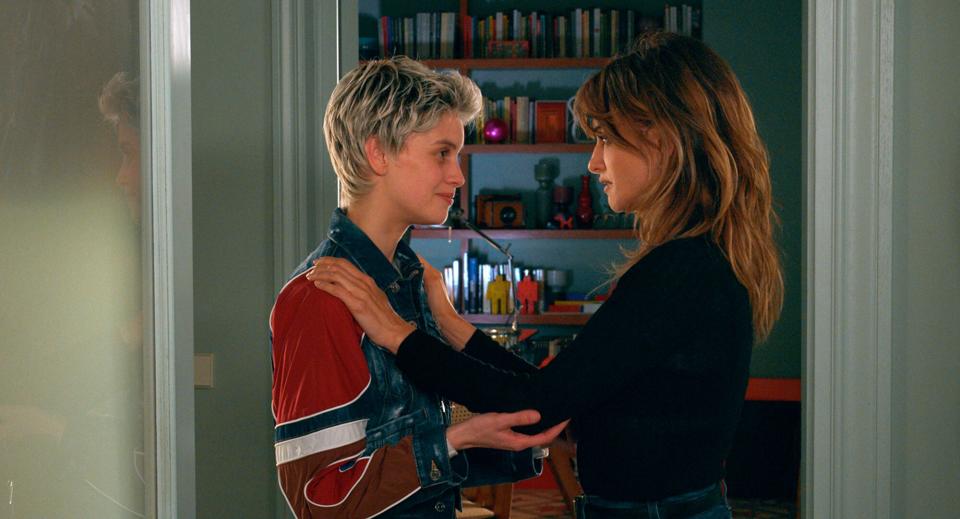Parallel Mothers review: Two pregnant women align in Pedro Almodovar's messy but lovely new film

- Oops!Something went wrong.Please try again later.
- Oops!Something went wrong.Please try again later.
- Oops!Something went wrong.Please try again later.
- Oops!Something went wrong.Please try again later.
Midway through Parallel Mothers, Penelope Cruz wears a t-shirt stamped with the phrase "We Should All Be Feminists," a popular slogan sprung from a viral TED talk by the Nigerian writer and essayist Chimamanda Ngozi Adichie a few years ago. It's true of course, but it feels almost redundant to see those words spelled out in a movie by Pedro Almodóvar — a filmmaker whose work has always felt not just feminist but deeply, joyfully humanist, even when the many messy pieces of his latest don't quite coalesce.
Parallel Mothers — which earned Almodóvar's longtime muse Cruz the Best Actress prize at the Venice International Film Festival earlier this month, along with a nine-minute standing ovation — is also one of his more overtly political movies, down to the final sobering postscript. But it begins as a simple story of two strangers who meet on a maternity ward in Madrid: Cruz's Janis, a photographer on the cusp of 40, and 17-year-old Ana (Milena Smit). Both are there without partners, though only Janis has made peace with that; Ana is scared and disoriented, and the pair form a gentle, tentative bond while they grind their way through the lonely work of labor and childbirth. Once their respective baby girls are treated in neonatal care and released the pair fondly part ways, too consumed with the duties of new motherhood to manage much more than an occasional check-in.
Janis soon has other problems anyway: When Arturo, the kind but unavailable father of the baby she names Cecilia — he's already got another life, and a wife — comes by to see them, he confesses that he can feel in his bones the baby isn't his own. Janis is outraged (she knows for a fact she hasn't slept with anyone else), but her own doubts have been sown, and genetic testing confirms something she doesn't want to know and can't even begin to think about telling Ana. So for weeks that turn into months she keeps the secret to herself, until fate, or maybe just the circular geography of Madrid, eventually brings them together again. It will also take her back to Arturo, whose work as a forensic anthropologist may be the key to exhuming the remains of the beloved grandfather she never met, buried in a mass grave decades ago during the dark days of the Spanish Civil War.

El Deseo/Iglesias Más/Sony Pictures Classics
If the outlines of all this sound like pure melodrama, that's not far off; at least a few of the movie's more outrageous threads wouldn't feel out of place in a telenovela. But Almodovar in his inimitable way styles it as something stranger, sweeter, and more profound: a freighted tale of memory and identity, connection and desire filtered through the lens of his particular melancholic whimsy. Who are Janis and Ana — both women who've hardly had the chance to know their own mothers , and their fathers even less — to each other without clear lines or blood ties?
The path that Parallel lays out for them takes a scenic route — one whose sudden turns strain credulity more than once, particularly in one late romantic twist. But it's also a movie filled with the simple pleasure of his signatures: The bright candy-colored apartments and casual beauty of his Spanish scenery; the familiar faces of his regulars (among them longtime alum Rossy de Palma, who appears as Janis' supremely capable best friend) and the revelation of newer ones like Aitana Sánchez-Gijón as Ana's elegant, anxious mom, a well-born theater actress honest enough to admit how ill-suited she's always been to parenting, though maybe not quite enough to understand the damage that has done.
And then there are his two stars; it's cliché by now to say that Almodovar loves women, but Parallel is a singular showcase for Cruz, whose lovely, lived-in performance could easily have been overplayed, and for the lesser-known Smit, whose raw longing and willful bravado splendidly pierce the scrim of midlife self-regard around her. Though the movie is too chaotically and improbably plotted to quite reach the resonance of some of the director's best work, the vividness of their presence on screen, and the grace he gives them in the end — more than 40 years into his career, and not quite three since the release of his last film, 2019's transcendent Pain and Glory — feels almost like stepping back into a long conversation with an old friend; a dialogue of decades, told two hours at a time. Grade: B+
Parallel Mothers, which closes out the New York Film Festival on Oct. 8, will be in theaters Dec. 24.
Related content:

